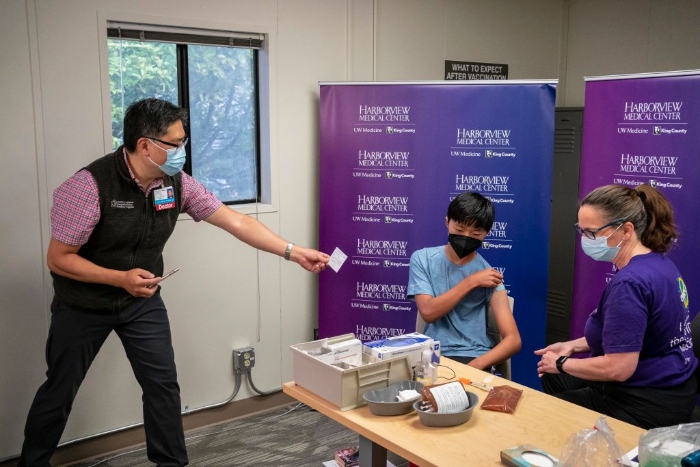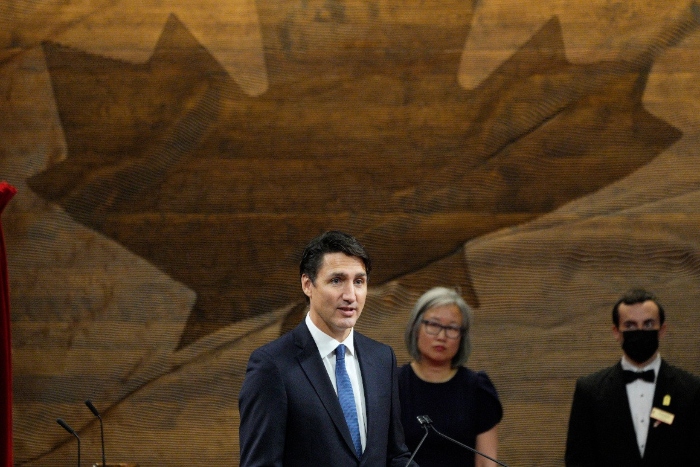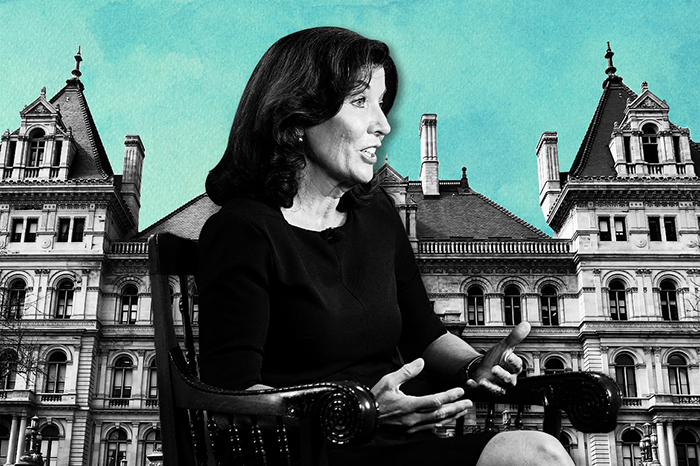| | |  | BY MYAH WARD AND JOANNE KENEN | | With help from Renuka Rayasam JAB-BERWOCKY — It’s been eight months since the FDA granted emergency use authorization for the first Covid vaccine. But the FDA and other federal health agencies still have a long to-do list when it comes to immunizations. They checked off one item this week — the FDA and a CDC advisory panel both authorized a third Pfizer or Moderna shot for severely immunocompromised people. (There are still questions about Johnson & Johnson boosters for such patients.) But the agencies have plenty left to do as we try to fend off Delta — and prepare for whatever could come next. Here’s our look at key items on the list. We figure the FDA commissioner would be carrying it around in his/her pocket — if we had an FDA commissioner. — From EUA to full approval: The shots available in the U.S. so far all have emergency use authorizations — not the usual full approval. That’s been one reason some people give for still holding back from being vaccinated, seeing the shots as “experimental” and untrustworthy (even though they went through a lot more clinical trials and testing than many people perceive). The FDA is preparing to act on this pretty soon. We could see full approval for Pfizer/BioNTech as early as September, possibly even this month. Moderna’s approval should come later this fall. J&J has said it expects to submit its application for full approval later this year. Lots of the vaccine hesitant — nearly one-third, according to a Kaiser Family Foundation Vaccine Monitor survey earlier this summer — said they’d be more willing to get the shot once it gets full approval. It’s impossible to know whether they’ll find another reason to fear the vaccine. Full approval may also make more employers, venues, travel companies or government entities willing to push ahead with vaccine mandates for adults and older teens, who were covered by the initial EUAs. Legally it might not make a difference, but the optics of full approval vs. an emergency OK might make mandates a tad easier to impose.
| 
John Choe hands a vaccine card to his son, Benjamin, after he received a first dose of the Pfizer Covid-19 vaccine from nurse Maureen Stevens at Harborview Medical Center in Seattle. | David Ryder/Getty Images | — Vaccines for children: Schools are already open in some parts of the country, but shots might not come for the under-12 crowd as soon as some parents wish — and as other parents fear. The FDA has been saying since the spring that it hopes to have vaccines authorized for children this fall or winter. Some experts have called on the FDA and CDC to break the process into two age groups, prioritizing school-aged kids, 5-12, before the 5 and under group. A Pfizer spokesperson told the Atlantic this week that the company plans to submit an EUA application for the 5-11 group by the end of September, and for 5 years and under, “shortly thereafter.” Moderna said its full data set would be ready by year-end or early 2022. The company has nearly doubled the estimated enrollment for its under-12 study, our colleagues Lauren Gardner and Katherine Ellen Foley wrote in this morning’s POLITICO Pro Prescription Pulse. J&J is in developing studies and should begin trials for younger groups this fall, the company told CNN. — More boosters: Anthony Fauci said Thursday that everyone will need a booster “sooner or later.” That covers a lot of ground. Health agencies are monitoring the data so they can move quickly when it’s time for a third dose, Fauci, the president’s chief medical adviser, said in a White House press briefing. The CDC’s advisory committee will meet again Aug. 24 to discuss Covid boosters. And about that “One and Done?” Experts are evaluating whether J&J recipients will need a second dose — and whether their second jab should be an mRNA vaccine (like Moderna or Pfizer) for extra protection. One of the selling points of J&J was that it was a “one and done” vaccination — but Delta seems to have had other ideas. — In the pipeline: We may have new vaccine options next year as companies like AstraZeneca and Novavax seek U.S. approval. AstraZeneca, which is being used elsewhere in the world, has said it intends to skip the fast-track emergency authorization and take a little longer to go straight for full FDA approval. Novavax, which has never brought a product to market and has had some production setbacks, again delayed its timeline last week. It now plans to apply for FDA authorization in the fourth quarter. — On the list or off the list? Will a company develop a nasal spray vaccine, which may help prevent the spread of Covid? Will it make people who are afraid of needles get immunized? Will it even work? Helen Branswell had a good explainer in STAT this week about the potential benefits of intranasal vaccines, as well as the hurdles. All in all, it’s a long to-do list. And if there’s one thing we know from this pandemic that keeps throwing us new curves, it could get longer. We’re only about halfway through the Greek alphabet. Welcome to POLITICO Nightly. Reach out with news, tips and ideas for us at nightly@politico.com. Or contact tonight’s authors at mward@politico.com or jkenen@politico.com and on Twitter at @MyahWard or @JoanneKenen.
| |
| | A message from AT&T: Accessible, affordable broadband helps communities reach their American Dream. That’s why AT&T is making a $2 billion, 3-year commitment toward helping close the digital divide, so more low-income families have the ability to succeed. Find out how. | | | | | — Eviction ban survives initial court challenge: A federal judge allowed the Biden administration’s new eviction moratorium to remain in place today until higher courts decide its legality. District Judge Dabney Friedrich in Washington said the CDC lacked the power to issue the ban. But Friedrich said she had to let it stay in effect because it was strikingly similar to an earlier eviction moratorium that the U.S. Court of Appeals for the D.C. Circuit ruled could stay in force during litigation. — Sources: U.S. planning for a full embassy withdrawal as the Taliban close in on Kabul: The massive Taliban offensive has put the government in Kabul on its heels, and the Pentagon has started planning for a full withdrawal of the American mission in Kabul, three people familiar with the preparation told POLITICO, with two saying U.S. Central Command sees a full embassy evacuation as “inevitable.” In a sign of the deep concern permeating Washington, the embassy’s facility manager ordered staff today to start destroying documents and equipment.
| |
| | STEP INSIDE THE WEST WING: What's really happening in West Wing offices? Find out who's up, who's down, and who really has the president’s ear in our West Wing Playbook newsletter, the insider's guide to the Biden White House and Cabinet. For buzzy nuggets and details that you won't find anywhere else, subscribe today. | | | | | — RNC chair lambasts term ‘birthing person’: Republican National Committee Chair Ronna McDaniel today attacked the term “birthing person” in a tirade against Democrats that she delivered at the RNC’s summer meeting . She received raucous applause from the room of Republicans at the final session of the meeting in Nashville when she sharply criticized the term. The words “pregnant person” were used recently in CDC guidance to acknowledge that not all people who give birth identify as women, such as some transgender men and nonbinary people. The Biden administration has referred to “pregnant people” in the past. — Assembly to suspend Cuomo impeachment investigation: The New York State Assembly will suspend its impeachment investigation into Gov. Andrew Cuomo “upon the governor’s resignation,” Speaker Carl Heastie announced today. Cuomo announced Tuesday that he would resign, effective Aug. 24. His announcement came a day after Heastie and Judiciary Chair Charles Lavine detailed their plans to introduce articles of impeachment in a matter of weeks. — 9 Dems threaten mutiny over Pelosi’s budget plan: A group of nine moderates is threatening to withhold their votes from Democrats’ $3.5 trillion budget resolution later this month, endangering Speaker Nancy Pelosi’s two-track plan to push both a massive infrastructure bill and social spending agenda through the House in the coming weeks. That missive — which was made public today — quickly escalated tensions across the Democratic caucus, with anxieties already running high about how the tightly divided House will be able to muscle through both of Biden’s priorities in short order.
| |
| | A message from AT&T:  
| | | | | DEAR NIGHTLY — The pandemic is as confusing as ever. So Judge Renu is back in session! She selected two more reader questions and answered them below. Send more of your questions about Covid and managing life in the pandemic to nightly@politico.com. I’m going to visit relatives soon, and some of them (whole families) had mild cases of Covid last year. They maintain they can forgo vaccines because antibodies protect them. Some also have children younger than 12. I’m nervous about being around them. Should I be? — Nervous Bonnie It’s certainly true that getting Covid offers some level of immunity from the virus. But immunity from getting the disease is less durable and less consistent than immunity from a vaccine, said Kavita Patel, a primary care doctor at Mary’s Center, a community clinic in Washington, D.C., and a nonresident fellow at the Brookings Institution. And now we have data showing that people with prior Covid cases are far more susceptible to reinfection than people who get vaccinated. A CDC study of hundreds of Kentuckians that was published last Friday showed that unvaccinated people who had Covid were more than twice as likely to contract the virus again, compared to people who got vaccinated after getting sick. So bottom line: Yes, you should be worried even if you are vaccinated. You will be mingling with people who have a likelihood of getting reinfected with the Delta variant and passing it onto you. Breakthrough infections are rare if you are vaccinated and likely to be mild with that protection. Still, even a mild Covid case doesn’t sound like fun. If you are in a high risk group you have even more occasion to be worried. But, more important, your relatives should be alarmed. I will soon be teaching adults for two eight-hour days indoors in a county where less than 60 percent of people are fully vaccinated. I come from a university with an excellent record of Covid management — more than 85 percent of employees are vaccinated. Normally we would be masked up, but the training won’t be in a university facility so they are letting us decide to mask or not. I expect most audience members will not be masked and many will not be vaccinated. I have worn a mask for eight hours before and it’s not fun. Whether I mask or not seems to me to be a determination of my obligation to unvaccinated people, to not unknowingly pass the virus to them. I am not concerned for my own health as I am vaccinated and do not fear a rare breakthrough case. Are there any other considerations I should include? What are my obligations? What is the ethical decision? — Beth in Indiana Trust me, I totally, completely get it. Masks are uncomfortable. They make your face sweaty and hot and ruin your makeup. They complicate communication — I feel like I am always shouting to be heard through my mask. Still, I think you should don one for those 16 hours. Here’s why. First, the science. It’s been drilled into us, for good reason, that masks protect people around us from well, us. But it’s also true that masks protect the wearer , especially if it’s a high quality, well-fitted one. Masks keep you from inhaling more virus particles. Patel said she’s sending her kids to school in KN95 masks. You said you don’t fear a rare breakthrough case, which is fair, but it’s important to consider that you could carry the virus to friends or family who could be susceptible to more serious illness. Plus you sound like a nice person who would probably feel guilt rather than schadenfreude if one of your students does get seriously ill. Then there’s our obligation to society. We’re not in a place in the pandemic where we can stop thinking about that yet. Vaccinated people can still spread the virus even if they don’t show symptoms themselves — so the more people who wear masks, the lower overall transmission will be in a community. That’s why the CDC recommended that even vaccinated people wear masks indoors. Finally, there’s something to be said for setting an example and making certain behavior feel normal. If you wear a mask, especially as the teacher, your students might be more likely to as well. Think about those one or two students who feel conflicted about mask wearing because they don’t want to stand out. Maybe they have an elderly parent or unvaccinated kid at home. When you are struggling with post-class maskne, perhaps it might help to picture them.
| |
| | SUBSCRIBE TO "THE RECAST" TODAY: Power is shifting in Washington and in communities across the country. More people are demanding a seat at the table, insisting that politics is personal and not all policy is equitable. The Recast is a twice-weekly newsletter that explores the changing power dynamics in Washington and breaks down how race and identity are recasting politics and policy in America. Get fresh insights, scoops and dispatches on this crucial intersection from across the country and hear critical new voices that challenge business as usual. Don't miss out, SUBSCRIBE . Thank you to our sponsor, Intel. | | | | | | | | 
Canadian Prime Minister Justin Trudeau speaks at an event. | Paul Chiasson/The Canadian Press via AP | CANADA VOTES — Only a truly catastrophic event could prevent what has seemed inevitable for months in Ottawa: a federal election. POLITICO Canada’s Nick Taylor-Vaisey explains what is happening up north for Americans: Canadians will almost certainly vote on Sept. 20, after Prime Minister Justin Trudeau almost certainly calls a federal election this Sunday. Trudeau technically requires the permission of Queen Elizabeth’s representative in Canada, Governor General Mary Simon, to send the country to the polls. — The traditional stroll: Simon lives in a stately residence known as Rideau Hall. Prime ministers usually live in a dilapidated mansion across the street at 24 Sussex Drive, and typically stride over to the GG’s home to make their formal request. Trudeau turned his nose up at 24 Sussex and lives in a slightly more modest home on the same sprawling property as Simon. He’s got a leafier walk than his predecessors. — The stakes: Trudeau is calling the election for a reason. His Liberals hold a minority of seats in the House of Commons. They’ve needed to win opposition support for every measure, and oppositions can get cranky. Liberals are the odds-on favorites to win a majority according to every poll. — The players: The opponents who look to defeat Trudeau include Conservative Leader Erin O’Toole, who took the helm of the party less than a year ago. O’Toole has tried to push his party toward the center with support for carbon pricing, for example. New Democratic Party Leader Jagmeet Singh and Bloc Québécois’ Yves-François Blanchet will be running their second campaigns. Green Party Leader Annamie Paul will be contesting her first. — The issues: The Delta wave presents an obvious question: Who is best suited to lead Canadians out of this health and economic crisis? Two other issues — climate change and reconciliation with the Indigenous of Canada — have rarely left headlines during this second summer of pandemic. — The risks: Americans might chuckle at the brief length of Canadian elections. This one will likely last the minimum of 36 days (they can stretch as long as 50). But that leaves plenty of time for volatility. Trudeau’s Liberals vaulted from third place to first place in 2015 (that was a 78-day campaign, under old rules). An anxiety-inducing return to school could breed resentment. Or not. The race is on. Want more on Election ‘21 in Canada? Starting Monday morning, the new Ottawa Playbook will be your daily look inside Canadian politics and power, shedding light on what’s really driving the agenda on Parliament Hill, who the true players are that shape politics and policy across Canada, and the impact it makes on the world. Subscribe to Ottawa Playbook today.
| | SOMEHOW, FINDING LAUGHS — Matt Wuerker brings us the best in political humor and cartoons in the latest edition of Weekend Wrap, including the fallout from Andrew Cuomo’s resignation, the IPCC climate change report and the ongoing response to the Delta variant.
| 
| | | | |
1.67 degrees F The amount that combined land and ocean-surface temperatures were higher this July when compared to the 20th century average of 60.4 degrees F, according to NOAA , making it the hottest July since records began 142 years ago. |
| | | | 
Istock/AP/POLITICOillustration | JUST THE BEGINNING — Last year, New York state Sen. Julia Salazar was approached by a former New York political staffer whom Salazar described as still politically well-connected in Brooklyn. He wanted to talk to her about some issues, he said. Salazar represents the area where they both live, so she said yes, expecting a chat over coffee. Instead, the former staffer showed up dressed nicely and suggested a white-tablecloth Italian restaurant. It was unusual, but Salazar tentatively went along with it. She said his comments veered toward her appearance. He touched her hand a few times. He asked if she liked boats, because he had a lot of friends in the Hamptons who had boats, and he could take her out on one. He also said that he had driven by her apartment and noticed she didn’t have a car. Would she like one? he wanted to know. “I can do things for you,” he said a few times. To Salazar, the implication was clear: He was looking for a sugar baby. And he was hoping Salazar would be interested. When New York Gov. Andrew Cuomo announced his resignation this week, Lt. Gov. Kathy Hochul, the woman who will succeed him, pledged to clean up the “toxic work environment” that had flourished under Cuomo. POLITICO Magazine Associate Editor Katelyn Fossett spent the week talking with women in New York politics and government — politicians and staffers, current and former — and they’re not sure it will be so easy. They say the culture — of harassment, of sexism, of bullying, of protecting those in power — goes much deeper than Cuomo. “I’ve worked in other industries, including service industries. I’ve worked as a waitress and barista,” Salazar said. “And in all of those workplace environments, I did not find sexism and gender-based harassment and sexual harassment to be as pervasive as it is in politics in Albany.”
| |
| | A message from AT&T: Susana Chávez became valedictorian of International High School at Langley Park while juggling numerous jobs throughout school. But what kept her powering through it all was her American Dream. With the help of accessible and affordable broadband, she was able to focus on her studies, get assistance from teachers and stay in touch with her mother back home. And thanks to Access from AT&T, we can connect low-income households like Susana’s, and more communities in areas we serve with their American Dream. Find out how. | | | Did someone forward this email to you? Sign up here. | |
|
| | Follow us on Twitter | | | FOLLOW US
|
| |
